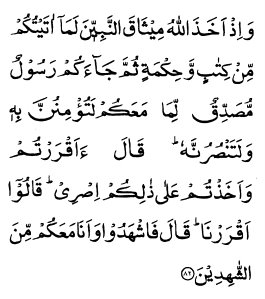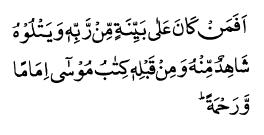In chapter Ale-Imran, Allah mentions a covenant entered by prophets, and through them, their people. This covenant makes it binding on them to believe in the messenger to come and to help him:

And (remember the time) when Allah took a covenant from the Prophets, (saying), ‘Whatever I give you of the Book and Wisdom (and) then there comes to you a Messenger, fulfilling that which is with you, you shall believe in him and help him.’ (And) He said, ‘Do you agree, and do you accept the responsibility which I lay upon you in this (matter)?’ They said, ‘We agree.’ He said, ‘Then bear witness and I am with you among the witnesses.’ (3:82)
In particular, this covenant related to the coming of the Holy Prophet of Islamsaw, whose advent was foretold by earlier prophets, but it is also a covenant relating to any future prophet. A covenant by a prophet is, in fact, a covenant by all his followers. When Messengers of God do come, they come to the people and it is the people who are tested in the fulfillment of the covenant taken by their prophets.
The question is whether this covenant was also entered by the Holy Prophet Muhammadsaw and through him, by his people? We see in chapter Al-Ahzab:

And (call to mind) when We took from the Prophets their covenant, and from thee, and from Noah and Abraham, and Moses and Jesus, son of Mary, and We (indeed), took from them a solemn covenant; (33:8)
Here “thee”, the addressee of this verse, is the Holy Prophet
saw. He is entering the same covenant as entered by the earlier prophets, details of which are mentioned in 3:82 (above): that he would believe in and help the prophet to come. There is no other
Mithaq al-Nabiyyin mentioned in the Holy Quran. Clearly the people of Muhammad
saw, the Muslims, are also bound by it. That “prophet to come” is variously known as Issa (Jesus) and Mahdi in traditions. However, it would not be the same Jesus who was sent to the
Bani-Israel some two thousand years ago. That Jesus has died and Quran is itself a witness to his death. It would be someone born among the people of Muhammad
saw. He has metaphorically been given the name of Issa Ibn-e-Maryam (Jesus son of Mary) to indicate his remarable similarity with the earlier Issa. In one tradition narrated in Sahih-Muslim, the Holy Prophet
saw calls him
Nabi-ullah (prophet of God) no less than four times.



